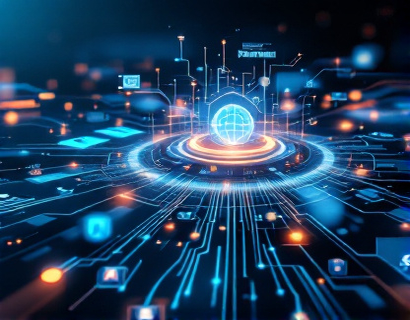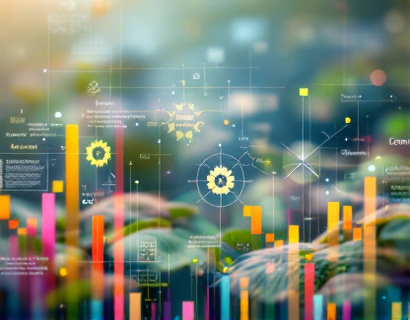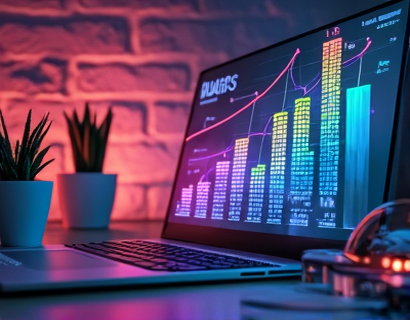AI and Crypto: Transforming App Ecosystems for Enhanced Productivity and Digital Innovation
The rapid evolution of technology has led to the emergence of two groundbreaking fields: artificial intelligence (AI) and cryptocurrency. These innovations are not just standalone phenomena; they are converging to create a transformative impact on app ecosystems, enhancing productivity and driving digital innovation. This article explores how the fusion of AI and cryptocurrency is redefining the landscape for tech-savvy professionals and early adopters, ultimately leading to more efficient and innovative solutions.
The Rise of AI and Cryptocurrency
Artificial intelligence has revolutionized various sectors by enabling machines to learn from data, make decisions, and perform tasks that traditionally required human intelligence. From natural language processing to computer vision, AI applications are becoming increasingly sophisticated. On the other hand, cryptocurrency has disrupted the financial landscape by introducing decentralized digital currencies that operate on blockchain technology. This technology ensures transparency, security, and immutability, making it an attractive option for various applications beyond finance.
Understanding App Ecosystems
An app ecosystem refers to the interconnected network of applications that work together to provide users with a seamless experience. These ecosystems are designed to enhance productivity by integrating various tools and services that cater to specific user needs. With the integration of AI and cryptocurrency, app ecosystems are evolving to offer more personalized, efficient, and secure solutions.
Enhancing Productivity with AI
AI technologies are being integrated into applications to automate tasks, analyze data, and provide insights that can significantly enhance productivity. For instance, AI-powered virtual assistants can manage schedules, set reminders, and even handle customer inquiries, allowing professionals to focus on more strategic tasks. Additionally, AI algorithms can analyze user behavior and preferences, enabling applications to offer personalized recommendations and streamline workflows.
Automation of Routine Tasks
One of the most significant advantages of AI is its ability to automate routine tasks. Applications that leverage AI can perform repetitive functions with high accuracy and speed, reducing the time and effort required from users. For example, AI-driven project management tools can automatically assign tasks based on team members' strengths and availability, ensuring optimal resource allocation.
Data Analysis and Insights
AI excels at processing vast amounts of data quickly and efficiently. Applications that utilize AI for data analysis can uncover trends, patterns, and insights that would be challenging for humans to identify. This capability allows businesses to make informed decisions based on real-time data, ultimately enhancing productivity and driving innovation.
Cryptocurrency: A New Paradigm for Transactions
Cryptocurrency introduces a new paradigm for transactions within app ecosystems. By utilizing blockchain technology, applications can facilitate secure and transparent transactions without the need for intermediaries. This not only reduces transaction costs but also enhances the overall user experience.
Decentralization and Security
One of the key benefits of cryptocurrency is its decentralized nature. Unlike traditional financial systems, which rely on central authorities, cryptocurrencies operate on a peer-to-peer network. This decentralization enhances security, as transactions are recorded on a public ledger that is immutable and transparent. Users can trust that their transactions are secure and that their data is protected.
Microtransactions and New Business Models
The integration of cryptocurrency into app ecosystems enables new business models, particularly through microtransactions. Users can pay for services or features in small increments, allowing for greater flexibility and accessibility. This model is particularly appealing for applications that offer premium features or content, as it lowers the barrier to entry for users.
The Synergy of AI and Cryptocurrency
The combination of AI and cryptocurrency creates a powerful synergy that can transform app ecosystems. By leveraging the strengths of both technologies, developers can create applications that are not only efficient but also innovative and user-centric.
Smart Contracts and Automation
Smart contracts, which are self-executing contracts with the terms of the agreement directly written into code, are a prime example of how AI and cryptocurrency can work together. These contracts can automate processes such as payments, ensuring that transactions occur only when specific conditions are met. This automation reduces the need for intermediaries and enhances efficiency.
Enhanced User Experience
AI can analyze user behavior and preferences, allowing applications to offer personalized experiences. When combined with cryptocurrency, applications can provide tailored financial solutions, such as customized investment strategies or personalized payment options. This enhanced user experience fosters greater engagement and satisfaction.
Real-World Applications of AI and Cryptocurrency
The integration of AI and cryptocurrency is already being realized in various sectors, showcasing the potential of this transformative fusion.
Finance and Investment
In the finance sector, AI algorithms are being used to analyze market trends and make investment decisions. Cryptocurrency trading platforms are leveraging AI to provide users with insights and recommendations based on real-time data. Additionally, smart contracts are automating transactions, making the trading process more efficient and secure.
Supply Chain Management
AI and cryptocurrency are also making waves in supply chain management. AI can optimize logistics and inventory management, while blockchain technology ensures transparency and traceability. This combination enhances efficiency and reduces costs, ultimately benefiting businesses and consumers alike.
Healthcare
In healthcare, AI is being used to analyze patient data and provide personalized treatment plans. Cryptocurrency can facilitate secure transactions for medical services, ensuring that patient data remains confidential. This integration has the potential to revolutionize the healthcare industry by improving patient outcomes and streamlining processes.
Challenges and Considerations
While the fusion of AI and cryptocurrency presents numerous opportunities, it also comes with challenges that need to be addressed.
Regulatory Concerns
The regulatory landscape surrounding cryptocurrency is still evolving. Governments and regulatory bodies are working to establish frameworks that ensure consumer protection while fostering innovation. Developers must navigate these regulations to create compliant applications that can thrive in the market.
Security Risks
Despite the inherent security features of blockchain technology, the integration of AI and cryptocurrency is not without risks. Cybersecurity threats, such as hacking and data breaches, pose significant challenges. Developers must prioritize security measures to protect user data and maintain trust.
The Future of App Ecosystems
As AI and cryptocurrency continue to evolve, the future of app ecosystems looks promising. The integration of these technologies will lead to more efficient, secure, and user-centric applications that cater to the needs of tech-savvy professionals and early adopters.
Continuous Innovation
The rapid pace of technological advancement ensures that innovation will remain at the forefront of app development. As AI algorithms become more sophisticated and blockchain technology matures, developers will have access to new tools and capabilities that can enhance productivity and drive digital innovation.
Collaboration and Interoperability
The future of app ecosystems will also be characterized by collaboration and interoperability. Applications that can seamlessly integrate with one another will provide users with a more cohesive experience. This interconnectedness will enable users to leverage multiple tools and services, ultimately enhancing productivity.
Conclusion
The fusion of AI and cryptocurrency is transforming app ecosystems, enhancing productivity and driving digital innovation. As these technologies continue to evolve, they will redefine the way professionals and early adopters interact with applications. By embracing the potential of AI and cryptocurrency, users can unlock new levels of efficiency and innovation, paving the way for a more productive digital landscape.











































